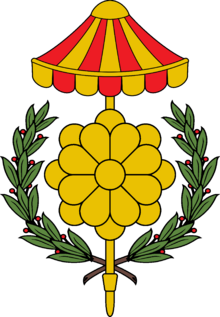Ecumenical Vayonism: Difference between revisions
No edit summary |
No edit summary |
||
| Line 71: | Line 71: | ||
'''Ecumenical Vayonism''' refers to the [[Vayonism|Faith of the Sixteen]] under the theological and doctrinal leadership of the '''Ecumenical Orthodox Communion'''. It is the largest Vayonist {{wp|religious denomination|denomination}}, with approximately 2 billion Ecumenical Vayonists worldwide. | '''Ecumenical Vayonism''' refers to the [[Vayonism|Faith of the Sixteen]] under the theological and doctrinal leadership of the '''Ecumenical Orthodox Communion'''. It is the largest Vayonist {{wp|religious denomination|denomination}}, with approximately 2 billion Ecumenical Vayonists worldwide. | ||
The Ecumenical Communion considers itself to be the singular legitimate authority in the Faith, as codified by the three [[Augurs of the Faith (Vayonism)|Augurs]], and that all other communions are either in {{wp|heterodoxy}} or open {{wp|schism}} with the Ecumenical (i.e. universal) Communion. The beliefs of Ecumenical Vayonism are based on the [[Vayonism#Fundamental Creed|Fundamental Creed]]. It operates as a communion of {{wp|autocephaly|autocephalies}} under the authority of a Patriarch or Matriarch, united in matters of {{wp|theology}} but independent in regards to {{wp|rite}}. The Patriarch of [[Haliarchic State|New Elyria]], known as the Haliarch, is considered by Ecumenical Vayonists to be the successor of [[Vayon of Aratheda|Vayon the Foreteller]] and singular earthly head of the Faith, being first among equals. Upon his death or abdication, the remaining Patriarchs meet in [[ | The Ecumenical Communion considers itself to be the singular legitimate authority in the Faith, as codified by the three [[Augurs of the Faith (Vayonism)|Augurs]], and that all other communions are either in {{wp|heterodoxy}} or open {{wp|schism}} with the Ecumenical (i.e. universal) Communion. The beliefs of Ecumenical Vayonism are based on the [[Vayonism#Fundamental Creed|Fundamental Creed]]. It operates as a communion of {{wp|autocephaly|autocephalies}} under the authority of a Patriarch or Matriarch, united in matters of {{wp|theology}} but independent in regards to {{wp|rite}}. The Patriarch of [[Haliarchic State|New Elyria]], known as the Haliarch, is considered by Ecumenical Vayonists to be the successor of [[Vayon of Aratheda|Vayon the Foreteller]] and singular earthly head of the Faith, being first among equals. Upon his death or abdication, the remaining Patriarchs meet in [[Haliarchic State|Holy Elyria]] to form a Conclave and elect a new Haliarch. | ||
{{INWU}} | {{INWU}} | ||
[[Category:INWU]] | [[Category:INWU]] | ||
Latest revision as of 16:11, 23 February 2020
Ecumenical Communion | |
|---|---|
 Faith Flower, parasol and Haliarchic olive wreath of the Ecumenical Communion | |
| Classification | Ecumenical |
| Theology | Ecumenical Vayonistic |
| Polity | Eparchal |
| Haliarch | Divian XVI |
| Divisions |
|
| Language | Elyrian and others |
| Liturgy | Veranian Rite, Western Rite, Pelagian Rite, New Diharan Rite, and others |
| Headquarters | See of the Exalted Sixteen, New Elyria, Haliarchic State |
| Founder | Narsa the Catechist, according to Ecumenical Vayonist tradition |
| Members | 2 billion |
Ecumenical Vayonism refers to the Faith of the Sixteen under the theological and doctrinal leadership of the Ecumenical Orthodox Communion. It is the largest Vayonist denomination, with approximately 2 billion Ecumenical Vayonists worldwide.
The Ecumenical Communion considers itself to be the singular legitimate authority in the Faith, as codified by the three Augurs, and that all other communions are either in heterodoxy or open schism with the Ecumenical (i.e. universal) Communion. The beliefs of Ecumenical Vayonism are based on the Fundamental Creed. It operates as a communion of autocephalies under the authority of a Patriarch or Matriarch, united in matters of theology but independent in regards to rite. The Patriarch of New Elyria, known as the Haliarch, is considered by Ecumenical Vayonists to be the successor of Vayon the Foreteller and singular earthly head of the Faith, being first among equals. Upon his death or abdication, the remaining Patriarchs meet in Holy Elyria to form a Conclave and elect a new Haliarch.
